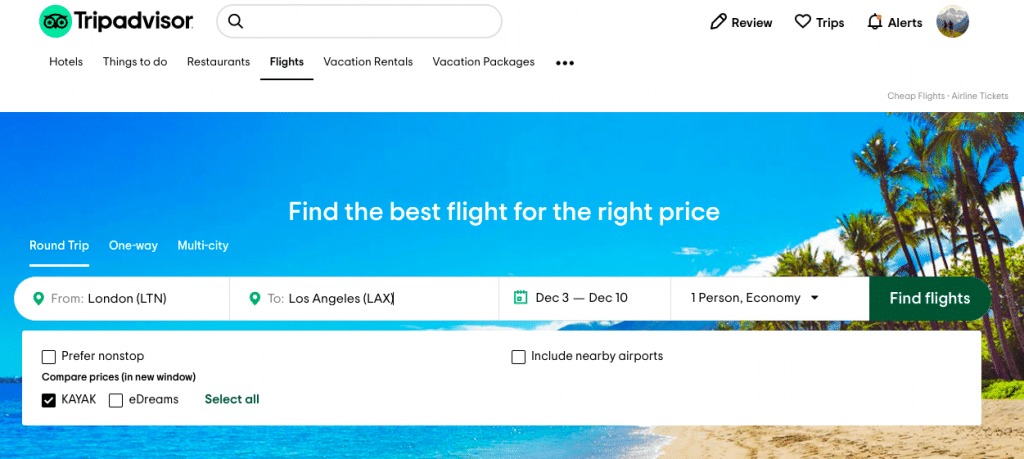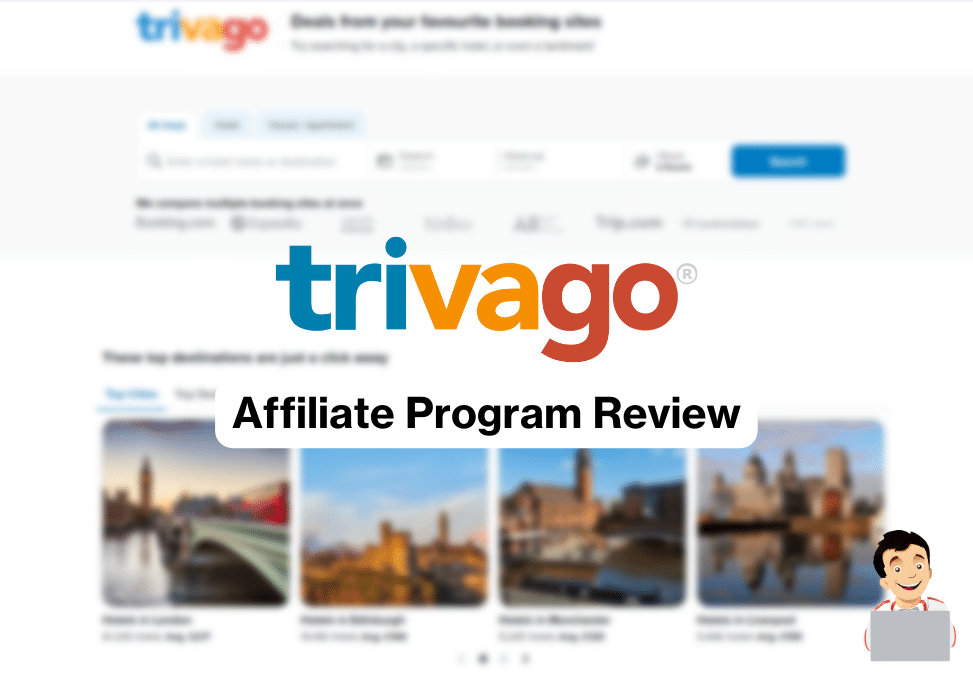If you’ve been searching for ways of monetizing your travel blog or website and you’ve run out of ideas, considering becoming an affiliate for a well-known travel brand might be a good idea.
In today’s article, we’re tackling the Trivago affiliate scheme – complete with how much you can expect to earn using this opportunity and what (potentially better) alternatives exist these days.
Trivago Affiliate Program Review
How does Trivago work?
Trivago can be considered an aggregator as the data that it works with is pulled from famous websites such as Expedia, Booking.com, or Hotels.com. It is mostly focused on getting accommodation to locations based anywhere around the world.
There are millions of results that users can browse through when they perform a simple search. They are not going to be immediately redirected to one of the partner sites and they can compare the cost and the features of the accommodation still within the Trivago website.

For example, when you look for a location, select the number of people and the number of rooms required during a set period of time, you’re prompted with results that can be easily categorized depending on your preferences.
You can select the guest rating, location, type of property (whether a hotel or an apartment), fine-tune the price that you expect to pay per night, and sort the results based on whether they are recommended by Trivago, based on the price, or based on the reviews that these places have received over time.
When the user clicks on a specific result, they can see more photos of that specific accommodation along where they can find the lowest price. They’re also given a useful piece of information – whether they can rely on free cancellation or not.
What services can you recommend to your audience?
It would have been a little more helpful for you, as a potential affiliate, to be able to recommend other travel-related experiences or services, whether that be flights, car rentals, activities, or anything else in this sense.
Unfortunately, Trivago is concentrated on hotel and apartment bookings, so that’s about as far as you can go.

There’s no specific pricing that you need to note in your content, no matter the type of media property that you own, for the simple reason that Trivago does not sell these services directly. Consequently, the cost of the accommodations depend on the platforms the data is pulled from.
What you’re basically doing when you are recommending Trivago is directing people to a link on their website that is or is not affiliated to the next website, whether that be Booking, Expedia, Hotels.com, or anything else.
Trivago affiliate sign-up
You might have a bit of trouble joining the Trivago affiliate programme right now – there’s no specific page on the brand’s own website that lets you know the information that you should be aware of.
However, if you perform a Google search, you’ll be prompted with multiple results on separate platforms where you can find it.
Whether it is still available on these networks or not, you will have to find out on your own. Based on what we came across, it seems that the Trivago Partners program can be found on anything from Sovrn/commerce (also previously known as VigLink), CJ Affiliate (the formerly known Commission Junction), or TradeTracker.

We also found a link from TravelPayouts.com, the largest affiliate network specifically designed for travel affiliate platforms.
Trivago commission rates – How much you can make
What is the Trivago affiliate program commission that you can expect? Believe it or not, even when it comes to this detail, we found pretty confusing information. According to the TravelPayouts page that details the program, you can expect a commission rate of 40% out of the sale you’re referring to with a cookie lifetime of 30 days.
We’re not surprised by either of these two since they’d make for a fairly decent affiliate program that you ought to be interested in. Unfortunately, other sources suggest different things – a commission rate of $0.083 per sale and a session-based cookie, which could mean that it doesn’t even last for 24 hours.
Some of the platforms that we went on to find out what this program has to offer specify that they are no longer working with the company without providing an explanation or whether or not the program will come back at any point.
So, considering all of this, we would strongly advise that you do some research on your own and try to reach out to customer service to find out whether you can actually use Trivago to monetize your content right now.

Payment thresholds and methods
The payment information when it comes to being a Trivago affiliate actually depends on the network you’re going to be using to manage everything.
The majority of the platforms that we have already mentioned work with various payment methods, so that would mean that you wouldn’t have to be restricted to good old PayPal.
Most self-managed affiliate programs work with PayPal alone, and that can be a bit of a drawback for some affiliate marketers.
Pros and cons to using the Trivago partner program
When it comes to becoming the affiliate of any company out there, you need to make sure that your values as a content creator and those promoted by the brand match pretty well.
Naturally, with affiliate marketing, some of that rule is slightly bent because you’re promoting services in exchange for commissions, after all. When it comes to the benefits and drawbacks of this affiliate program, we’d say that it feels as if it no longer exists.

First off, there’s no place on the website itself that could suggest that they work with affiliates or any separate network. All of the other sources that we have come across, including the pages we checked out on various network websites, suggest that the program no longer exists.
So then why not just specify this on the company’s own website? If that’s the case, of course – because the program definitely seems to be available on other platforms, including TravelPayouts.
We’d be happy with the 40% revenue share and the 30-day cookie lifetime, but in the end, we have to advise that you do as much research on the program as possible.
Trivago affiliate program alternatives
Booking.com
This is one of the largest websites for travel in the world right now – it offers anything from accommodation for vacations and flights to car rentals and more. There are both pros and cons when it comes to the Booking affiliate program and if you’d like to find out more about it in general, we suggest you give our review a read.

As a Booking.com affiliate, you make 25% out of whatever Booking.com is making from the sale you are generating through the program. In other words, you’re not making a quarter of the sale per se but rather whatever the company earns from it.
In terms of payment methods, you can choose between PayPal and direct deposit. The threshold is 100 euros, which can be a bit of a drawback for beginning affiliates.
Viator
You’re not going to be blown away by the commission rate of this program, but it does make a good alternative if you’d like to try something besides Trivago.
You can make 8% if you sign up to the program directly on the Viator website or 4% if you decide to use the easier way and opt for using ShareASale instead.
The cookie lasts for the 30 days that you can expect from most of the affiliate programs that exist these days.
GetYourGuide
This is a fairly well-known website, which means that you might have less of a hard time recommending it to your audience. There are several different ways of accessing the affiliate program – you can use the brand’s own website or join through a separate network such as Skimlinks, CJ Affiliate, or Awin.

Depending on what you tend to use, you’ll get different commission rates. For example, signing up directly on the company’s own website will make you a 8% commission. That rate is 7% on either Awin or CJ Affiliate but on Skimlinks, it’s just 5%.
Another detail that we need to note here is that you can actually negotiate your rate with your affiliate manager if your performance is stellar and get it to be increased to 10% or 12%.
You might also like: Awin Affiliate Network Review
Skyscanner
The Skyscanner affiliate program should be a good option if you don’t feel like you have enough reasons to join the Trivago partner program. It’s one of the best-known websites when it comes to flights and other travel-related services.
You can make 20% out of every sale that you refer to the business. There’s only one way of accessing the affiliate program in this case and it’s through the Impact Radius network, a platform that we have reviewed in the past.
TripAdvisor
There’s pretty much only one drawback when it comes to being a TripAdvisor affiliate and it’s the fact that the cookie lasts for just two weeks. Other than that, you have all the reasons to consider this option, from the commission rate to how it all works.

You make 50% out of all of the sales that you refer. TripAdvisor doesn’t directly sell hotel bookings, so you basically go from one link to the next – your referrals click on your affiliate link, then on the one on TripAdvisor, and they end up on the website that actually sells the service.
Based on the estimates made by TripAdvisor, it seems that the conversion rate is pretty good — with less than 1,000 clicks per month, you’re supposed to make at least $500 in commissions, which we would argue isn’t too bad. Everything works through CJ Affiliate, so you should create an account on that platform.
Read more: Skimlinks Review
Expedia
This is a very interesting affiliate program in the sense that you get paid different commission rates for vacations, flights, and other travel experiences purchased through your affiliate link and via Expedia, but depending on the person making the purchase and where they travel, you earn differently.
For example, for the United States, you can expect a cookie duration of 7 days with a rate of 6% for cruises, 5% for activities, just 3% for hotels, and only 2% for vacation rentals.
For the United Kingdom, you benefit from a 30-day cookie duration, 6% on hotels, 7% on activities, and 5% on cars, but cruises are unavailable.
You will have to decide whether or not it makes sense to join the Expedia affiliate program, but we’d say that it’s a good idea if you do not want to keep all of your eggs in one basket.
You might also like: CJ Affiliate Review
Hotels.com
Hotels.com is yet another very large platform for booking vacations, activities, renting cars, or getting packages and flights. The program runs through CJ Affiliate, so you should create an account with that platform if you want to join.

What’s interesting about this opportunity is that how much you earn depends on where you’re based. For example, if you join through the United States and Canada program, you’ll be able to get commissions on bookings from people based in those two countries.
As for how much you can earn, the commission rate you can expect with this one is 4% and the cookie lasts for just 7 days.
Need help with your SEO or digital marketing efforts? We have lots of plans and courses available. Get in touch to find out how we can be of assistance!

Leave a Reply